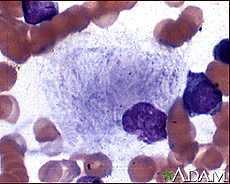National Institutes of Health
- The primary NIH organization for research on Gaucher's Disease is the National Institute of Neurological Disorders and Stroke
 A service of the U.S. National Library of Medicine
A service of the U.S. National Library of Medicine  National Institutes of Health
National Institutes of Health
Gaucher's disease is a rare, inherited disorder that causes too much of a substance called glucocerebroside to build up in your spleen, liver, lungs, bones and sometimes in your brain. The buildup prevents these organs from working properly.
There are three types:
Gaucher's disease has no cure. Treatment options for types 1 and 3 include medicine and enzyme replacement therapy, which is usually very effective. There is no good treatment for the brain damage of type 2.
NIH: National Institute of Neurological Disorders and Stroke
References and abstracts from MEDLINE/PubMed (National Library of Medicine)
